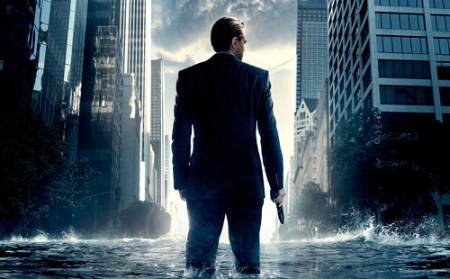
There are seventy thousand Jedi knights in Australia. Four hundred thousand in England and Wales. In New Zealand, Jedi is the second most popular religious affiliation, ahead of Judaism, Islam, Buddhism, and most everything else. So concluded the official 2001 census in each of these countries.
It is unclear how many respondents were serious about their Jedi faith, but their governments did not take them seriously. Tallies were ignored or reclassified, and citizens were threatened with fines for providing “false or misleading” information.
So it is forbidden. Religions may not originate in movies–at least not in movies of Star Wars mediocre quality. But with the unprecedented critical and commercial acclaim of the hit film Inception, some of the formerly irreligious are reportedly inspired to worship again.
Let’s take a (mostly spoiler-free) look at Inception’s spiritual and religious themes:
- Dom Cobb once offered his skills in service to the rich and powerful. Having failed to satisfy them completely, he placed his own life in danger. Cobb now lives in exile.
- Cobb has money and power of his own, enough to guarantee worldly comforts, but it does not satisfy him. What Cobb truly desires, and would give everything to achieve, is a reunion.
- Reunion seems unattainable. Nevertheless, Cobb is inspired to take a leap of faith. There is no proof that the work can be done, but he is finally resolved to try.
- In order to complete his task, Cobb must first enter an extremely deep state of relaxation. Through his prior education and training, Cobb knows that the seeds planted within this state will bear fruit in normal waking life.
- Within this near-death experience, Dom Cobb finds himself under attack. Some of his attackers are projections of his own subconscious mind, and others originate elsewhere. These demons manifest themselves within a dream state, and although they are not “real”, they are nevertheless capable of thwarting his progress.
- Cobb has prepared himself well for the challenges that lie ahead. With the support of his teachers and companions, he is now capable of entering dreams within dreams within dreams.
- Cobb is not the owner of these dream worlds, he is only a temporary inhabitant. Nevertheless he can access extraordinary powers and privileges within them, because unlike most of the natives, Cobb fully realizes that he is asleep!
- At the same time, Cobb is fully awakened with respect to individual dream worlds, which he is therefore capable of entering and leaving at will. The sensation of jumping back into the real world–or the realer world, or perhaps the merely different world–is similar to leaving free fall.
- Cobb discovers these worlds can be seductive. Although he enjoys visiting them, even for decades at a time, he never feels quite as comfortable there as in his old home.
Does this sound like the foundation for a new cult religion? Or, do you think it sounds like a religion that already exists?
Very interesting. I promise this isn’t self promotion I wrote a review here:(http://myweeklyparty.blogspot.com/2010/07/my-weekly-movie-spoiler.html)
It pertains to this kind of discussion of the film. Thanks